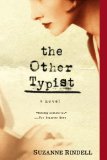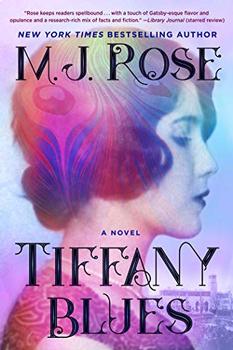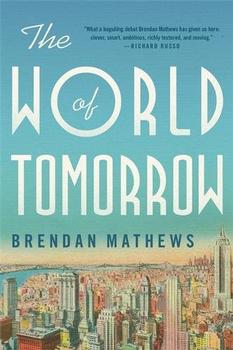Summary | Excerpt | Reading Guide | Reviews | Beyond the book | Read-Alikes | Genres & Themes | Author Bio

A Novel
by Suzanne RindellOh, how clever Suzanne Rindell was to make her protagonist a writer. Rose Baker is a typist at a New York City police precinct. Her job is to record on a stenograph the confessions that the Sergeant or Lieutenant Detective extract from suspects, and then transcribe her dictation using a typewriter. "I am there," she says, "to make the official and unbiased record that will eventually be used in court. I am there to transcribe what will eventually come to be known as the truth."
If you raised your eyebrow at that phrase - "come to be known as the truth" - you are right. Rose speaks of "the truth" not as an objective thing but as something created. She is hinting of her power within the elaborate process of legally created truth. The reader would do well to pay heed. In an early scene, Rose and her bosses are frustrated at their inability to crack a serial killer whom they know for certain is guilty. Rose solves that problem with just a few keystrokes, and the killer goes to jail. So what implications does this clinical attitude toward the truth have for Rose's first-person narration of her own tale in Rindell's debut The Other Typist?
Rose purports to be a poor orphan, raised by nuns and schooled in a trade by necessity at the Astoria Stenographers College for Ladies. She is prim, stern, and exacting. ("As a moral person, I do not relish hearing these gruesome details" she says of the confessions she types). She espouses a conservative kind of modernism specific to the 1920s, one that allows her to celebrate the technologies that give her gender a new freedom in the workplace, but deplore the sexual freedom of the Jazz Age.
Enter Odalie Lazare, the other typist of the title and the very embodiment of Jazz Age licentiousness. Rose tells us, "Her voice quivered with a sort of tomboy energy that suggested, despite her refined poise and sophistication, she was a robust individual," but also that "the voluptuous glee in Odalie's demeanor hinted at privilege, at a childhood that had been filled with automobiles and tennis courts." Odalie is Daisy Buchanan and Jordan Baker rolled into one. Rindell cites The Great Gatsby in her acknowledgements and there are many tributes to Fitzgerald's novel in The Other Typist, including a party at a Long Island mansion that might as well be Jay Gatsby's.
Odalie radiates glamour and danger, and before long, she is whisking Rose to speakeasies all around the city [see Beyond the Book]. The novel delights in portraying these secret spaces, such as the wig shop which functions as a "blind," where you must select the correct wig and say the correct sentence in order for the clerk to type a sequence on his cash register to move the wall aside, revealing the lounge within, where a dwarf in red suspenders and a trilby hat serves champagne cocktails—"one part absinthe, two parts champagne." But if Odalie is like Daisy and Jordan, she is also like Jay Gatsby himself, with a mysterious past and a shadowy empire at her fingertips. She is no mere typist, and she soon draws Rose into her illicit dealings.
Or is she? Rose's tale begins to show the sutures where "the truth" is being concocted before our eyes. She mentions the psychiatrist who has recently begun caring for her, and then she talks about the newspapers that have covered the story she is now unfolding for us. Her voice is like a cross between Merricat in Shirley Jackson's overlooked masterpiece, We Have Always Lived in the Castle and Humbert Humbert in Nabokov's Lolita. Rindell's version of an unreliable narrator is less deft and layered than either of those books, and aims more to entertain than to unsettle the reader with deeper questions about the narratives by which we live our lives, but Rindell has nonetheless constructed a suspenseful story with a
propulsive pace. We know something will go wrong, but she leaves the reader guessing until the final pages exactly who will fall and exactly how the typist has transcribed her own confession.
![]() This review was originally published in The BookBrowse Review in July 2013, and has been updated for the
April 2014 edition.
Click here to go to this issue.
This review was originally published in The BookBrowse Review in July 2013, and has been updated for the
April 2014 edition.
Click here to go to this issue.

If you liked The Other Typist, try these:

by M.J. Rose
Published 2019
The New York Times bestselling author of The Library of Light and Shadow crafts a dazzling Jazz Age jewel—a novel of ambition, betrayal, and passion about a young painter whose traumatic past threatens to derail her career at a prestigious summer artists' colony run by Louis Comfort Tiffany of Tiffany & Co. fame. "[M.J. Rose] transports the ...

by Brendan Mathews
Published 2018
Three brothers caught up in a whirlwind week of love, blackmail, and betrayal culminating in an assassination plot, set in prewar New York.
Your guide toexceptional books
BookBrowse seeks out and recommends the best in contemporary fiction and nonfiction—books that not only engage and entertain but also deepen our understanding of ourselves and the world around us.